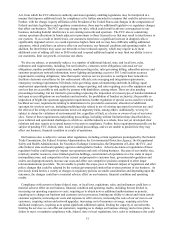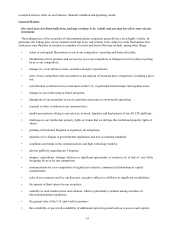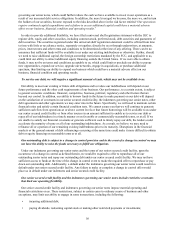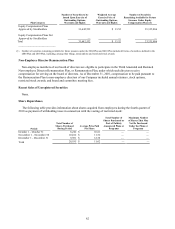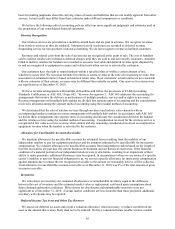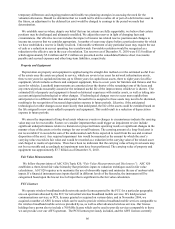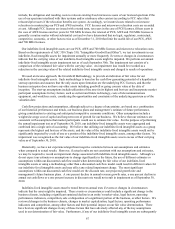Metro PCS 2010 Annual Report Download - page 68
Download and view the complete annual report
Please find page 68 of the 2010 Metro PCS annual report below. You can navigate through the pages in the report by either clicking on the pages listed below, or by using the keyword search tool below to find specific information within the annual report. 58
to new technologies, such as 4G LTE;
• limiting our ability to purchase additional spectrum or develop new metropolitan areas in the future;
• reducing the amount of cash available for working capital needs, capital expenditures for existing and new
markets and other corporate purposes by requiring us to dedicate a substantial portion of our cash flow
from operations to the payment of principal of, and interest on, our indebtedness; and
• placing us at a competitive disadvantage to our competitors who are less leveraged than we are.
Any of these risks could impair our ability to fund our operations or limit our ability to expand our business as
planned, which could have a material adverse effect on our business, financial condition, and operating results. In
addition, a substantial portion of our debt, including borrowings under our senior secured credit facility, bears
interest at variable rates. If market interest rates increase, variable-rate debt will create higher debt service
requirements, which could adversely affect our cash flow. While we have and may enter into agreements limiting
our exposure to higher interest rates in the future, any such agreements may not offer complete protection from this
risk, and any portion not subject to such agreements would have full exposure to higher interest rates.
Settlements, judgments, restraints on our current or future manner of doing business or legal costs resulting
from pending or future litigation could have an adverse effect on our business, financial condition, and
operating results.
We are regularly involved in a number of legal proceedings before various state and federal courts and the FCC.
Such legal proceedings can be complex, costly, protracted and highly disruptive to business operations by diverting
the attention and energies of management and other key personnel. Also, changes in the law or legal interpretations
can affect the outcome of existing rules. The assessment of the outcome of legal proceedings, including our potential
liability, if any, is a highly subjective process that requires judgments about future events that are not within our
control. The outcome of litigation, including amounts ultimately received or paid upon settlement or other resolution
of litigation and other contingencies may differ materially from amounts accrued in the financial statements. In
addition, litigation or similar proceedings could impose restraints on our current or future manner of doing business.
Further, litigation could be costly to defend, divert management’s attention from our business, and could subject us
to substantial liability. Such potential outcomes could have a material adverse effect on our business financial
condition, of operating results, or ability to do business.
We are currently controlled by a limited number of stockholders, and their interests may be different from
yours.
A certain portion of the voting power of our capital stock is concentrated in the hands of a few stockholders some
of which also have representatives who are members of our board of directors. As a result, if such persons act
together, they may have the ability to significantly influence whether required consents can be obtained and may
have substantial control over all matters submitted to our stockholders for approval, including the election and
removal of directors, changes in our capital structure, governance, stockholder approvals and the approval of any
merger, consolidation or sales of all or substantially all of our assets. These stockholders may have different interests
than the other holders of our common stock and may make decisions that are adverse to your interests.
Our stockholder rights plan could prevent a change in control of our Company in instances in which some
stockholders may believe a change in control is in their best interests.
We have a stockholder rights plan, or Rights Plan. Pursuant to the Rights Plan, we have issued to our stockholders
one preferred stock purchase right for each outstanding share of our common stock as of March 27, 2007. Each
right, when exercisable, will entitle its holder to purchase from us a unit consisting of one one-thousandth of a share
of series A junior participating preferred stock at $66.67 per share. Our Rights Plan is intended to protect
stockholders in the event of an unfair or coercive offer to acquire our Company and to provide our board of directors
with adequate time to evaluate unsolicited offers. The Rights Plan may prevent or make takeovers or unsolicited
corporate transactions more difficult. The Rights Plan will cause substantial dilution to a person or group that
attempts to acquire us on terms that our board of directors does not believe are in our best interests and those of our
stockholders and may discourage, delay or prevent a merger or acquisition that stockholders may consider favorable,
including transactions in which stockholders might otherwise receive a premium for their shares.





